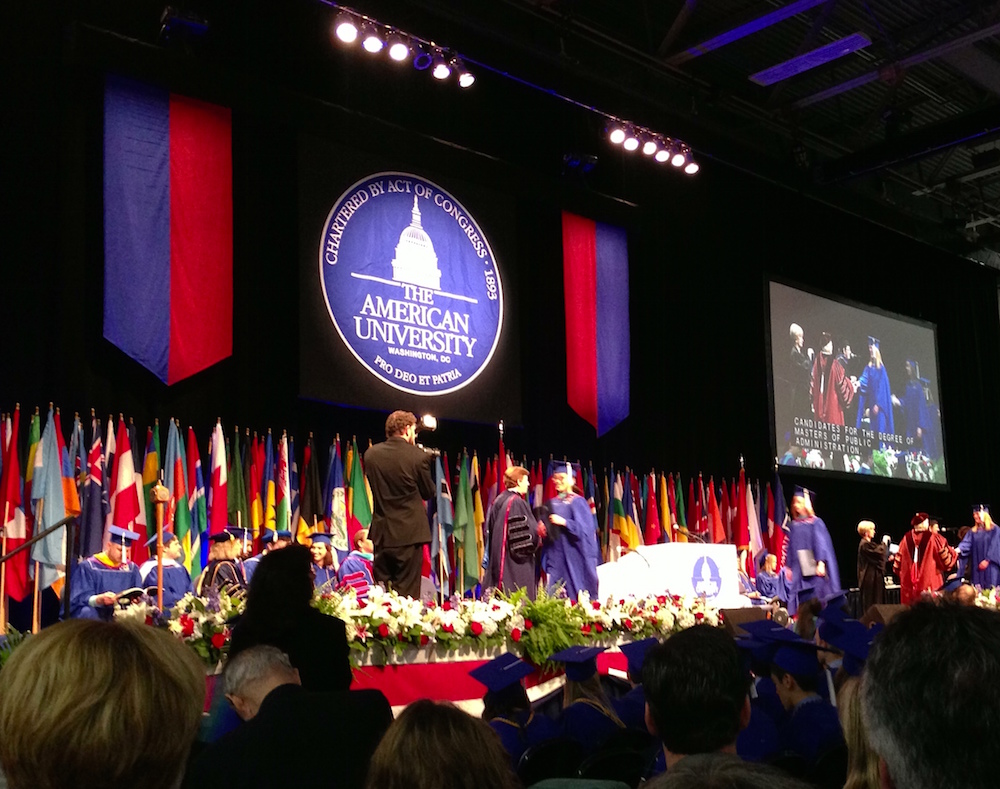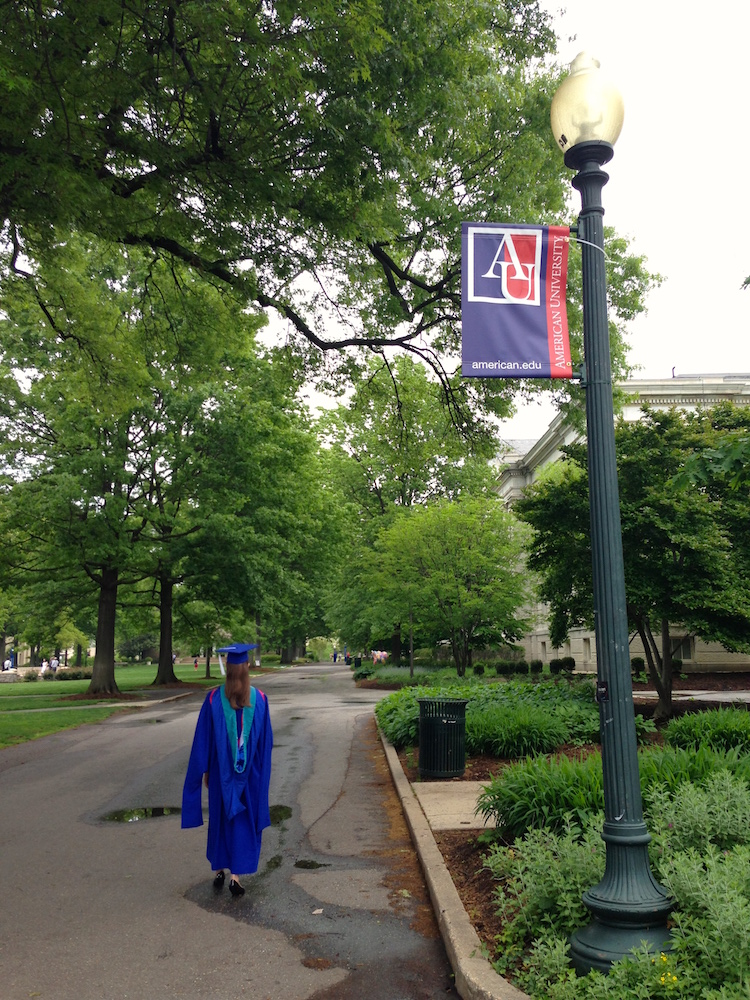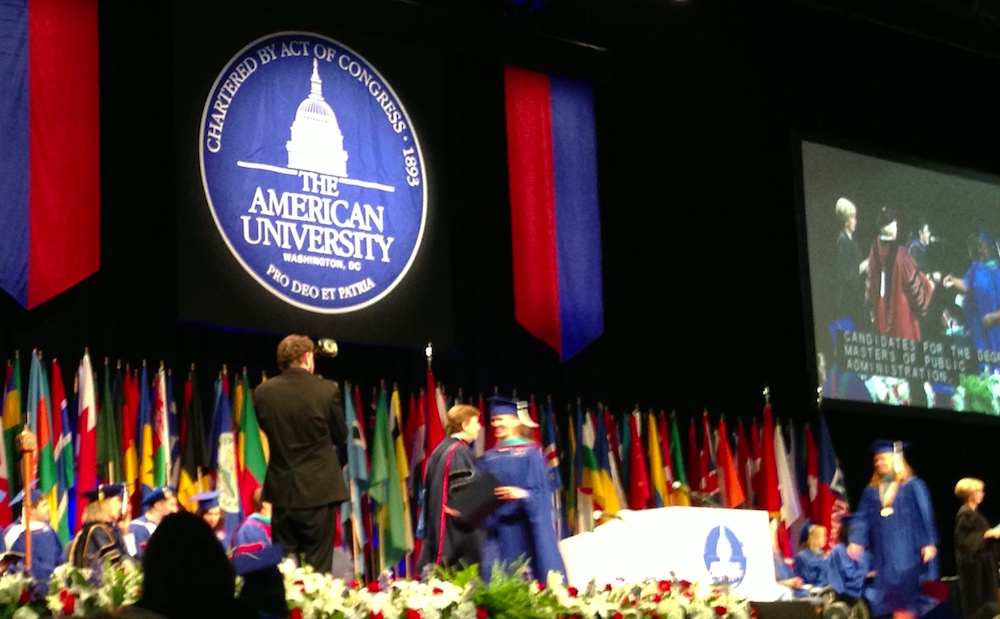*well sorta, keep reading…
So what’s a frugal weirdo to do when you want something that costs money, but you don’t want to pay for it? Get creative.
I wanted to go to grad school. Since graduating from undergrad in ’06, I had this overwhelming desire (delusion?) to get my master’s degree. I like school and I figured it would be a wise move for my budding career. However, I had zero intentions of paying for said grad school. After Mr. Frugalwoods and I maneuvered our way though undergrad without any debt,* I certainly had no interest in assuming any for my post-grad studies. And so, I began to scheme.
*This was accomplished primarily by the fact that we attended an inexpensive public university–the University of Kansas–and both had scholarships, worked throughout college, graduated on time in four years, and had assistance from our parents (thank you, parents–that’s the best gift you could’ve ever given us!)

The Golden Ticket Of Free Tuition
Being neither independently wealthy (at age 26) nor a thief, I knew I’d have to devise an inventive means to get through grad school without paying. I commenced researching my options and realized that most standard routes (grants, scholarships, employer benefits) would only cover a portion of tuition. However, there is one fool-proof trick for getting your higher education paid for: work full-time for the university you’re attending.
Most (if not all) colleges and universities in the US offer a benefit known as “tuition remission” to their full-time employees. What this glorious little perk entails is free tuition for the employee, their spouse/domestic partner, and their dependents. It’s a pretty sweet deal. There are, however, two caveats to just how sweet this deal is:
1) You (the student) must work full-time while going to school.
2) There’s a tax implication for graduate-level tuition, which is as follows: if the market value of the tuition being waived is greater than $5,250/calendar year, any amount above that is counted as taxable income. Undergraduate tuition, however, is always tax-free.
The Mrs. Frugalwoods Tuition Remission Mission Commences

Once I had the tempting phrase “tuition remission” emblazoned in my frugal brain, I knew I had to figure out a way to finagle it for myself and my grad school aspirations. I was, as you probably surmised, not working at a university when first I hatched this plan. And so as all good frugal weridos do, I bided my time…
Delaying costly purchases or decisions is a central element of how Mr. FW and I save money. We map out momentous acquisitions or undertakings for years before executing them. It’s the opposite of the impulse buy, it’s the Frugalwoods patented “contemplated buy.”
Here are but a few examples of our judicious deployment of this strategy:
- Buying a house: oh yeah, we’re the people who visited over 270 open houses before buying a single-family abode in one of the hottest real estate markets in the country.
- Adopting a dog: pets are a huge financial undertaking so we waited five years before bringing Frugal Hound into our family.
- Having kids: same story as pets, but more expensive and we waited longer–and then even longer thanks to a bout with infertility.
- Our homestead early retirement plans: the granddaddy of our research-and-wait methodology.
We don’t make snap decisions around here and we mull even medium-sized purchases for months at a time. To whit, we’re currently researching chest freezers, and we’ll take our sweet time deciding what, when, and where to buy.
I knew grad school would fall into our classic long-play strategy and so I sat tight until an opportune time to strike presented itself. And present itself it did!
A Strategic Strike
In 2010, Mr. FW’s job transferred him from Cambridge, MA to Washington, DC and I knew my moment had arrived. Rather than feel disgruntled about uprooting and leaving a job I enjoyed, I saw this as my shining opportunity to enact Operation Tuition Remission. Step one: I applied for every job I could even remotely be considered qualified for at every reputable university in the Washington, DC metro area (including Maryland and Virginia, just to be safe). Lo and behold, I snared one. If you apply for enough jobs, I’ve discovered, one of them is bound to stick. Took me upwards of 55 applications for my first job, 15 or so for my second, about 8 for my third, and 2 for my fourth. Fortunately I didn’t have to apply to anyone to become Mrs. Frugalwoods. Thank goodness for small victories.

At any rate, I was ecstatic that a university would employ me! And, it was a position in the field I’d been working in! Trust me, I would’ve taken the job of school mascot if need be. I’ll note here that before sending out these applications, I carefully researched each university’s policy regarding tuition remission benefits for employees. There is some variation between schools, but in general, one must be employed for a minimum number of months or years before one is eligible for said tuition remission.
Now I will state for the record that this plot of mine was not without a certain amount of risk since there was no guarantee I’d actually be accepted into the graduate school at the university where I was employed. Plus I’d also need to, ya know, not get fired from my university post in order to keep the remission benefit rolling in. But, these were risks I was willing to assume–although not without some gnashing of my frugal, worrywart teeth.
Given the fact that Mr. FW and I weren’t sure how long we’d be living in the ol’ District of Columbia, I was bound and determined to maximize my tuition scheme to its fullest potential. Hence, I began studying for the GRE (the standardized US test for grad school admissions) and preparing my application materials before I even started my position with the school. The timer on my eligibility to take advantage of tuition remission was four months of full-time employment, so I wanted to be ready to start classes on day one of month five. Fortunately, this aligned almost perfectly with the start of the spring semester, so I was golden–provided, of course, that I was accepted.
A Potential Hitch: Math Sans Calculator
As you may have gleaned, I am a person very comfortable with the written word, grammar, logic puzzles, and cognitive thinking–all of which are on the GRE. However, I am a person who squirms and turns red-hot (+ sweaty) when I need to do mental math. I go to great lengths to avoid doing math in all avenues of my life and I revert to excel spreadsheets and calculators to assist me with even the most basic of mathematical situations (let’s not get into how long it took me to determine the 40 week gestation of Babywoods… suffice it to say, I finally just wrote the weeks out on our shared google calendar).

Little did I know when I initiated this quest that not only does the GRE have a robust math section–you’re not allowed to use a calculator!* I’m not kidding when I say that this tidbit of news nearly derailed the entire Operation Tuition Remission. There were tears, there was strife. I even asked the department I was applying to if they’d accept any other form of evaluation besides the GRE–they would not.
Since we all know I wasn’t about to pay for test prep or books, I netted some hand-me-down GRE study materials and buckled down to the drudgery of teaching myself high school algebra and geometry, which I’ll be honest here, I never mastered in high school.
*I would like to point out that, in a fit of great irony, a year after I took the GRE they allowed calculator usage on the test.
I persevered and did very well on the written portions of the GRE and scraped by at the level of a 5th grader (perhaps a precocious 4th grader?) on the math section. Being that I’m not a masochist, I wasn’t applying for a math-based master’s program, so I figured I’d be OK.
I compiled the sundry other bits of my application during the first few months of my tenure at the university and submitted everything in time for my four-month mark. Despite my frankly abominable math scores, I was accepted into my program of choice: the Master’s of Public Administration with a concentration in Nonprofit Management at American University. And thus began my adventure as simultaneous full-time student and full-time employee.
A Note On Working Full-Time While Going To School Full-Time

In case you’re wondering, it’s a challenging gig. I worked the standard office schedule of 9-5 Monday-Friday and then attended class in the evenings–some nights from 5:30-8pm and others from 5:30-11pm… zzzzzz. I also took weekend daytime courses, so it wasn’t uncommon for me to be on campus every single day of the week.
Grueling to say the least, but anytime my spirits flagged, I reminded myself of the five-figure debt I was not incurring for this degree. For reference, the sticker price of my MA (comprising 42 credit hours) was $64,000, which I decidedly did not pay. Unfortunately, most of my classmates were paying even more since if you’re not working, you’re in need of student loans to cover both tuition and living expenses. Thanks to my job, I was able to manage both on my own.
This schedule isn’t for the faint of heart as it’s admittedly exhausting, but, it was honestly worth it in the end. Rather than stretch out my time, I elected to take a full course load in order to complete the degree in under two years. So, I took two to three classes per semester (including summers) and powered through with my fellow full-time students. There were many upsides to being a full-time student, including connection with my professors, a deep immersion in the subject matter, and, perhaps most importantly, the wonderful friendships I formed with my classmates (shout out to my grad school gang of ladies H, K, and M!).
I Graduated!

Since this would be a downer of a story if I hadn’t actually graduated, rest assured, I did it! I managed to swing a 3.95 GPA (not a 4.0 thanks to economics and statistics, both of which nearly drove me to distraction).
I have zero plans to pursue any further formal schoolin’, but I feel a real sense of accomplishment and pride that I earned my MA. Plus, my coursework greatly advanced my abilities as a writer and researcher, which as it turns out, is what I’ve wanted to do all along.
I will say, however, that I grossly underestimated how difficult it would be when I started out. Grad school is no joke and I spent pretty much every spare moment of every day studying. Commuting on the Metro? Studying. Sunday afternoons at home? Studying. Fourth of July BBQ? Oh, I’m studying. Lunch break at work? Definitely studying.
I can’t say I exactly recommend the taxing nature of working and going to school full-time, but if you want to get your MA, and you don’t want to pay, it’s the way to go This is a prime example of the perseverance of the frugal weirdo. We thrifty people will do just about anything to avoid debt and it’s a trait that has served Mr. FW and me well.
Learn From My Mistakes

Lest you think I’m a brilliant maven of snaring free things (why, thank you), rest assured that I made a plethora of mistakes in this process. Chiefly, I could’ve done this even more frugally had I gone to a less expensive school. American University is a pretty darn pricey private university. I snapped up the job I was offered at American because, well, it was the only job I was offered and I didn’t want to wait around and see if one of the cheaper schools would employ me. It was a strategic decision, but it did cost me.
Even though I wasn’t paying the sticker price for tuition, I was on the hook for the taxable income above the $5,250/calendar year cap. Hence, I paid approximately $13,500 in taxes over the two years it took me to earn my degree. These funds were automatically deducted from my paycheck every month, so as a result, my take-home pay was very, very loooooow. Good thing we lived the frugal lifestyle!
Aside from this financial shortcoming, my health suffered as a result of my punishing schedule and I gained 20 pounds over the course of completing my MA. Not so good. And it’s not like I gained the weight merely from sedentarily reading and writing at all hours–nope, I junk fooded it up. I regularly consumed bags of Cheetos, Doritos, and Oreos to fuel my study sessions, which is so very unadvisable for so very many reasons.
I subsequently lost all of that weight (and then some) thanks in large part to Mr. Frugalwoods’ encouragement for us both to do the couch-to-5k running program (we obviously weren’t going to pay for gym memberships), which I highly recommend. Additionally, our love of hiking ramped up as a result of my unhealthiness. We discovered that a day in the mountains was the best cure for my overstressed self.
My ongoing commitment to healthy eating–especially now during my pregnancy–was largely borne out of how gross I felt during this time period. Eating junk and not exercising is the classic short-sighted strategy for coping with stress and I’m glad I learned my lesson. I realized the other day that, even at almost 7 months pregnant, I still don’t weigh as much as I did during my grad school binge. Hooray for healthy food and clean living!
This Applies Beyond Grad School
While higher ed might be a distant memory for you, I think this approach is applicable to many different aspects of life. Mr. FW and I consistently apply ingenuity in figuring out how to accomplish goals that would, under normal circumstances, be expensive. But since we’re far from normal, we’re able to navigate our way into entirely free situations all the time.

One example that springs to mind is the free yoga class arrangment I’ve got going on. I work at the front desk of my yoga studio for a mere 30 minutes per week, and then I cart the studio trash barrel to the curb on Monday nights (which takes me all of 4 minutes), and voila: free yoga classes for Mrs. Frugalwoods! Classes are $18 a pop and I religiously attend at least twice a week, so I estimate I save circa $1,872 per year with this little gig. Plus, my involvement enabled me to become part of the yoga studio community. A frugal win all around!
Maybe you want to become a pilot–I hear those classes are exorbitant, but I’m willing to bet you might be able to work out a trade with an instructor. Perhaps you need to outfit a baby nursery–I know someone (hint: it’s me) who did it entirely for free by using the power of hand-me-downs, the Buy Nothing Project, and great trash finds. Perhaps you’re in need of a haircut–I bet you can find a friend who’ll cut it for you for free.

When we approach the world as collaborative givers, I find that there are very few things we actually need to pay for. I delight in sharing our items and talents with our community (for example: at this exact moment, one friend is borrowing Frugal Hound’s Dremel to file dog’s nails and another friend has borrowed Babywoods’ pack-and-play, which was a hand-me-down in the first place).
Leveraging what we already have–time, talent, abilities–to help each other makes life vastly more interesting to live. I’d much rather swap dog-sitting with our friends than pay a kennel to watch Frugal Hound. And we’d much rather cook dinner for our friends than pay a restaurant to do it for us. These are all rich life experiences and we don’t take the easy route out of forking over cold hard cash to facilitate what we need and want to do. And, don’t forget the power of delaying–by waiting for an auspicious moment, the savvy frugal weirdo is able to engineer cost-effective, well researched schemes.
If you want to do something, but don’t want to pay for it, challenge yourself to navigate your way around the typical consumer economy and find it for free (or cheap). I bet you’ll be able to work out a frugal deal for yourself.







Nicely done! I love how hard you worked to accomplish this. And that hood is pretty great! The agreement you have with your yoga studio is fantastic too. I credit card churned my way through my masters – because I knew I could make the payments. I did it before I got married and before we bought a house. That was key, I think! I also taught full time, so I was more confident I could pay the bills while earning rewards.
Nicely done! I’m all for hacking one’s way through school–just makes sense!
My daughter did the same thing at GW, they will pay almost all of her MA and doctorate program. She did attend undergrad there too. People just have to do their research to find out how to save money and get educated in the U.S.
That’s wonderful! Kudos to your daughter for finagling free tuition. It’s truly an amazing benefit.
I didn’t graduate from grad school with zero debt, but I will have my student loans paid off 6 years early! I also have worked as an adjunct for the last 8 years and have greatly enjoyed taking classes for free as one of my benefits. I’m thinking about going to PA school in a few years and am going to start taking the pre-reqs for that.
That’s great! Congrats on getting those loans paid off so early! And, nicely done on getting free classes through your position–that’s a great hack.
Two words: graduate assistantship! I was able to work part time while I completed my master’s degree, and this assistantship covered tuition. It was a fantastic arrangement, but as you mentioned, an incredible amount of work.
Fabulous! That sounds like a great solution!
Graduate assistantships are fantastic! I got free tuition and a stipend that was enough to cover college-student-level living expenses in exchange for 20 hours/wk of reasonably low-effort work as a teaching assistant for an introductory course in my field. The catch here (at least in my field) is that assistantships are generally reserved for students who plan to pursue a doctorate, but my school kindly didn’t pull my assistantship out from under me when I decided that a doctorate wasn’t for me after all and I was able to fund my whole master’s this way.
Well done! 20 hours a week sounds ideal. And, that’s awesome you were able to fund your whole master’s!!!
I know several people who earned their Master’s for free in the same way you did. Great job! That’s definitely the way to do it.
Thanks! I think it’s a great solution!
That’s a tempting way to pay for grad school! I remember our state U had the same policy. One long time employee graduated at the same time as us. He spent 17 years taking a course or two per semester and graduated with a bachelor’s degree for absolutely free (other than books I assume).
I almost went straight into the master’s in engineering program, and that would have come with not only free tuition, but $15000/yr in grad assistanceship for teaching or research plus another $15000/yr in scholarship (because they loved me and had a hard time filling grad school seats with native white Americans). I turned the offer down and paid full price for law school instead. 🙁 Womp, womp.
That’s a great story about the longterm employee earning his degree! It’s just such an awesome benefit out there. And, seems like your finances have recovered (to put it mildly) from law school 😉
Great advice! Another route to free graduate education is a grad assistantship, but in this day and age of state budget cuts, they are getting harder to find. I’m a faculty member at a public university, and I tell students considering graduate school to think long and hard about it–the financial implications are HUGE, especially if you’ve run up undergrad debt.
Like you, I was fortunate in that I didn’t have any debt at all from undergrad because I worked 30 hours/week during the semester and had no fewer than two jobs every summer, plus I had a generous scholarship. Even in grad school I worked summers. Well worth it. I have friends I from grad school (1996) who are STILL paying off education debts.
I’m so glad to hear you’re advising your students to consider the costs carefully. I feel like finances are so often overlooked when considering/discussing higher ed, so you are really doing them a favor! And, you’re very right about the incredible burden of grad school debt on top of undergrad debt–that’s a tough situation.
I did 2 undergrads, grad school and a post-grad diploma. It is estimated all of this cost me $100 000. My parents helped me the first few years. My husband helped me the last few years. I worked full time. I did end up with about $14 000 in student debt, one thousand for every year. It wasn’t perfect, but I think for the quality of education and the amount I am able to make now, it was worth it. I am not aware of Canadian universities having the same free tuition policies. That would have helped the undergrad/graduate. The post-grad I did distant education out of Penn State, so nothing was going to help there.
Most Canadian universities do have the same policy. I personally have many friends that have gone to university for free due to the fact that their parents were(are) employed by the university. I could have but decided to pursue a degree that was not offered at the small liberal arts university my mother works at.
There is a lesson I have learned 2 decades too late. However, if I had worked for the university, and not doing what I did, I would have missed my career. I guess it all worked out in the end!
That’s a really small amount of debt, Kristen, nicely done! And, like you said, sounds like it was all worth it in the end, which is what really matters.
I worked for Kaplan University’s marketing department and was able to complete my MBA for free. I completed the program in two years, while working fulltime. They cover full tuition for employees for any Kaplan undergraduate or graduate program, and the courses are online, which makes it much easier to plan around. Stats was a nightmare, but I ended up with a 4.0 at the end! It was totally worth it. I was always shocked that more of my coworkers didn’t take advantage of this great employment perk…it was basically like being given a $40k bonus! Another bonus: after I completed my MBA, I started a new job 3 weeks later with a 50% pay increase. I wouldn’t have been able to do that without my MBA. Thanks, Kaplan!
ps…I’m a KU grad too!
Rock Chalk Jayhawk!!! Way to go on getting a free MBA and then leveraging a higher salary. Nicely done!
I was getting paid during grad school (tuition waivers + living allowance), but quitting with my masters after 1 year was still a great financial decision (emotional, too – but that’s another story!) due to all the opportunity costs I would have been incurring if I had stayed another 4 years to finish a PhD with little additional benefits (for the career track that I wanted to pursue). So remember… even “free” grad school isn’t free due to opportunity costs!
Very true about the opportunity costs! Sounds like you made a great decision re. your PhD. What made it really worthwhile for me is that I was able to keep working in the same field while going to school. I think I would’ve had more pause about the decision if that hadn’t been the case.
I love that you mention the Buy Nothing Project here and AirBnB in your last post. Will you be AirBnB hosts or guests or both (that’s us).
My hubby and I both worked full time to pay his way through grad school with no debt and I have benefited greatly. Because of that and our fugal weirdoness I was able to fulfill my dream of being a stay at home mommy when our children were young. Looking back I can say I have no regrets about it.
That’s wonderful, Jill! Congrats to you two for creating the life you want through frugality :). And, I’m a huge fan of the Buy Nothing Project–both as a giver and a receiver! Regarding AirBnB, we plan to be hosts once we’re living on our homestead and we’ve greatly enjoyed being guests over the years. Such an awesome system!
This is a good tip, but ouch on the taxes! Especially in a place like DC.
I did ROTC in college, so only had to borrow for year 1 and room and board all 3 years. (Total borrowed: $11,000. In 1992 dollars.)
I paid that all off in 4 years. I lived in DC for about 5 years in the Navy and that’s when I paid it all off, starting at an Ensign’s pay of about $19,200 a year.
But that’s not all! Part of my Navy job included additional studies in nuclear engineering, about 7 months worth. Not an accredited program, but very informational.
When my studies were done and I was back “on the job”, I learned about a program that the Navy and our organization had for master’s degrees. It would be paid for (including books) if you got at least a “C” (or “B”?) and as long as it pertained to work. So VA Tech had a northern VA campus, and they had a master’s in engineering program that many of my cohorts signed up for. It was set up for full time workers.
For 2.5 years, I worked full time during the day and took classes at night and on weekends (10 classes total). The only other requirement is that you need to remain employed by the Navy (or in the Navy, in my case) for 1 year after taking classes. But that runs concurrently, so I only needed to be employed for one year after the end of my last class. That happened to coincide with the end of my 5 year commitment.
I’m not gonna lie, by the end, I was pretty burnt. Even though it was only 2 classes a semester, by the last semester – stick a fork in me, I was done. But I’m glad I did it. From the end of my last class, I then got married and started studying for the 8 hour professional engineer’s exam, because I’m insane.
The classes I took have been useful in my career, but more than useful they’ve gotten me hired because of doing the full time work + grad school.
Wow! Way to go Marcia! That sounds like an amazing way to work through higher ed. Plus, thank you for your service to our country! And, I totally agree with you, I was burnt out by the end, but glad I’d done it.
Also, I read your infertility link.
My husband and I started trying when I was 33. After a year, no luck, started the “battery of tests”. We were literally waiting the month to start IUI when I found out I was pregnant. (I was 35 and it had been 18 months.)
Weird. I wonder how often that happens? In my case, I’d just had an HSG, and apparently those “clear the way”, so to speak.
Oh that’s so wonderful! I am so happy for you and your husband! I had appointments made for both an HSG and IUI when we got pregnant. It’s just amazing how these things can work out. And, I think that type of unexplained infertility is really common, but rarely talked about. I’m glad we can open up on here and share these stories!
Blogged about this yesterday myself, and all I could think about while writing was when Billy Madison sings his “back to school, back to school” song. The husband went to graduate school full time for five years. He worked full time, and we paid cash the first two years. He was enrolled in a dual master’s / PhD program and secured funding (scholarship and stipend) after two years. He was then able to quit his horrible, boring job and focus purely on the PhD which he finished this spring! He now works as a college professor so I am able to attend classes for free. In my situation, I don’t need an advanced degree to further my career, and I’d never really considered the possibility. However, this opportunity presented itself, so I decided to avail myself purely out of the desire to learn. The hubs teaches at a private, Christian liberal arts college, and the graduate offerings are not extensive. In my case, the degree is one which contributes to my overall spiritual well-being and ability to serve others in our church community and longer term, perhaps to work in a faith-based environment.
I noticed several of my friends returned to school following the Great Recession with many even taking on debt to do so. Seemed counter-intuitive to me, but I’ve since learned that recessions tend to send people back to school.
Sounds like you and your husband navigated higher ed very wisely! Nicely done. And, that’s wonderful you’re able to take courses for free now. Great point about recessions driving enrollment–very true.
The law firm where I was an associate (and then a partner) paid for my Master of Laws in Securities Law. It was designed as a part-time program, so although it was tough to combine a 60-hour work week with school, it was doable – and I was even able to recycle some of my exam essays into client memoranda.
There are a number of companies that will pay all or part of the tuition for their employees. Sometimes, you have to get approval from your manager for the specific program you take (and it has to be considered relevant to your work) and sometimes the company is more flexible. Mr JH did an Executive M.Sc. in Technology Management at Columbia (an excellent program by the way) and only had to pay about 15% of the cost (spread out over 2.5 years). These programs usually have some strings attached – he was obliged to stay with his employer for 2 years past the date of each semester where he got tuition fees paid or he would have had to reimburse that semester’s fees.
My current employer has paid the tuition for my graduate certificate in financial services compliance and also paid for private tuition in Brazilian Portuguese. Sadly, I can’t convince them that my fine arts certificate programs in photography are work-relevant, but you can’t win them all.
I would add that if you take on a heavy burden that combines work with school (especially if your degree requires completion of a major essay or thesis), it can be helpful to build in extra incentives to complete those final credits. (I learned this the hard way when I failed to finish my undergraduate degree …) For my LL.M., I developed a thesis topic that was relevant to my work and I committed to present the paper on a specific date at a high profile conference in my industry, so I was motivated to get it done.
I, too, had an employer pay for the majority of my master’s (an MBA). And I found a program that would let me space out the classes so I could maximize the reimbursement each year to pay as little as possible out of pocket. As long as the classes are relevant to your current role, many employers will help pay for them. Even a small ad agency I worked at, with less than 20 employees, helped an employee get their master’s.
That’s wonderful, JH and Kate! Great points about wisely leveraging those employer benefits. It really makes sense to explore all these options before paying out of pocket for graduate degrees. Thanks for sharing your stories!
My tech employer will pay for a large portion of my tuition for my MS. I have to pay taxes on anything above $5,250, but I should manage to keep the amount they’ll reimburse around the maximum each year, so my out of pocket cost will mostly be the taxes! I’m pretty stoked! I only plan to take one course per academic time period. Two to three sounds a little too stressful for me!
Woohoo! That’s awesome, Leigh! Enjoy the ride 🙂
We both graduated from undergrad and felt that that was enough school. 🙂 Now we do our best to get work to pay for as much fun travel as possible, and have become masters of the weekend add-on trip. Almost like a masters of public administration. 🙂 Btw — isn’t it crazy how much schools charge people to go work at *non*profits???
Haha, very true! I love the business trip add-ons! Mr. FW and I do that whenever we can–totally worth it 🙂
I utilized my employer’s tuition assistance program to get my MBA. I had to be employed 6 months to utilize it and I began my Masters program about a week after my 6 month anniversary. If I would have taken my time and not taken a full class load, I could have gotten 100% of my degree covered by my employer. Instead though, I wanted to get the degree over with and graduated in just over a year and a half. As such, I went over the tuition reimbursement maximums per year and ended up paying about $5K for my MBA; however, this did not cause me to utilize any student loans, since I was working full time and could cover the tuition expense I did incur. As an added bonus to the full class load and full time work, I ended up pregnant for the last set of classes and attended my graduation ceremony with a 5 month baby bump showing!! Talk about doing everything at once! It all worked out for the best and I’m glad I did get my degree and pretty frugally.
Nicely done, Beth! I totally understand the desire to just get it done–that’s how I felt too. I was OK with jamming up my schedule to make it all end faster! That’s awesome you were pregnant at the end too! Gotta love when all those life events stack up at the same time 🙂
I also went to grad school while working (although I went part time), so I was able to make it through without taking on debt. My employer paid for some tuition and my parents helped out with the rest. Of course, I also won on the “opportunity cost” front – two years out of the workforce in my industry could be a death sentence.
I had many classmates who were employed full time by the school and were likely receiving the same tuition deal that you did. I think working for a university can be a great way to get reduced tuition, but even going part-time while working elsewhere can save you a ton.
Great point! Any work while in school is a wonderful idea! And, that’s great you made it through without debt–nicely done.
I worked my way through undergrad (while raising a kid and serving as an active duty Marine) so by the time I went to law school I was more than happy to just be a full time student. My family lived entirely off of student loans for three years. Of course that meant I took out massive student loans (large enough to buy a house in many parts of the country). That’s blasphemy in the financial/frugal world but I felt comfortable doing it because of one huge perk: my law school’s loan repayment program.
Because of that program, I receive a nice fat check from my law school twice a year that I use to make my loan payments. The program is on a 10 year repayment schedule and is income-based (sliding scale). I don’t have to work in a particular profession to qualify, nor do I even have to work full time. And that’s how I got my Ivy league law degree for free!
That’s terrific, Tasha! Way to go on leveraging your law school’s program. And, I’m super impressed you worked through undergrad while raising your kiddo and serving our country–wow. Talk about hustling :)!
I love the idea of “collaborative givers.” Bartering is something my dad always did as a dentist whenever he could. (He bartered dental work for my wedding dress! Thanks dad!) I also got my Masters degree for just about $17,500 by going to a school that only charged that much in graduate tuition (go BYU!). 🙂
Your dad sounds awesome! I’m a big fan of collaborative giving–just makes sense to me to avoid paying and instead help each other out however we can. And, nicely done on the cheap MA!
I used to work at a research lab and they covered my full tuition for my masters program. They also had other programs where they would pay you your salary while providing days off work for school. All this was covered under required training and so we never had to pay taxes on it. Great option for those in STEM areas.
Sounds fabulous, Yumi!
My employer paid for half of my masters and I worked full time while I completed it, so in the end it only cost me around $10k since I was already working to cover living expenses. Was it worth the $10k? Honestly probably not. But hindsight is 20/20. Good work securing a huge discount on your graduate degree!
Haha, I have that same thought sometimes about my degree, but hey, we did it!!!
This was very, very timely. My dear husband starts his employer-sponsored masters in the fall- while working full time. He’s “only” doing 8 credits this term though, although my understanding is that for Masters students, 9 counts as full-time. On the one hand, I’m bolstered knowing our frugal weirdo cred is rocking. On the other hand, I’m scared what this will all bring. Also a bit annoyed I didn’t think about the tax implications. Luckily, it’s an in-state state school, so we’ll max out probably $4-5k/yr past the limit.
Anyone know if the lifetime learning credit or tuition and fees deduction can apply to this overage? Tax stuff confuses me so much. I think Mrs. Frugalwoods and I share a similar numerical affliction.
Now to devise a “tasty treats that are not Oreos” list for DH so I have inspiration this fall…
Congrats to your husband–sounds like a great deal he’s got worked out! I sadly do not know the answer to your tax question :(. But I wish you all the best on creating healthy snacks for him… trust me, he’s going to need them!
I once had a job as an office manager at a university and could have gone to law school, for instance, nearly free–unfortunately I wanted to be a librarian, not a lawyer, and library programs are scarce in the DC area. And I was actively trying to get pregnant, so I did not pursue a graduate assistantship (Catholic U has good ones in library but it’s not a 100% comfortable place to be if you’re not Catholic, or so I’m told).
Here’s how I chose a grad school:
1. Pulled up the US News & World Report list of the 30 best library schools.
2. Checked which of those had 100% online options.
3. Checked which of those was cheapest. Hellooooo, U of Alabama! They charge in-state tuition and reduced fees for all distance students.
I paid for some of it myself. I got departmental scholarships for some of it. My grandfather paid for some of it after the babies began arriving, when things were tight. (He used to say that he only paid for undergrad, but now all his impecunious progeny keep hitting him up for master’s degrees.)
At the time I was applying, many library programs were charging close to a thousand dollars PER CREDIT. I paid more like a thousand per CLASS (when I paid at all). I don’t understand–when people commit to paying thirty or forty thousand dollars for a degree, how much do they think librarians make????
Sounds like a great deal you got there! Nice! And, I’m with you on the cost of degrees vs. expected salaries–my degree in non-profit management being another great example.
Fortunately the military paid for both undergrad and grad school, but I still worked full time throughout both degree programs. My degree program was designed for people working full time, so it was one class at a time for about 7 weeks each. Not completely easy, but totally doable!
Nicely done! That’s a wonderful way to have school paid for. And, thank you for your service to our country!
You were always thinking….. I distinctly recall the time in college when you …. Sat for an hour on a chest of drawers left at the curb, so no one else could take it, until your boyfriend (now your husband) got out of class to come help you load it up. You were bored sitting there so at least I got to have a great long phone conversation with you. Then another time you and your roommate needed a garage sale couch or something heavy delivered to your 2nd or 3rd floor apartment. You bargained with the football players across the hall and baked them enough banana bread or cookies to get your couch delivered. You folks just ask me, I know Ms F’s past!
This is great advice! Completing a series of internships and assistantships with the university (adding up to 40 hrs a week) got me half of my tuition paid for and a small but manageable stipend to live off of. I ended up paying about $12,000 for my masters degree but I know for a fact that my internship experience scored me a high paying job where I could pay off the debt in 2 years. While not completely paid for, the direct work experience and the limited debt put me light years ahead of my peers.
That’s great, Meghan! The value of work/internernship experience is certainly key and often directly correlated with salary and position. Nicely done!
In case you couldn’t tell, I’m Ms. F’s proud Mama.
Thanks, mom 🙂
1) Thanks for this great post! I’m going to link to it from my page on Grad Student Finances on how to paid for grad school through work (if you don’t mind). http://www.gradstudentfinances.org/work/ I need to edit the page a bit to account for this strategy!
2) I’m so glad you mentioned taxes on scholarships. This is such a confusing issue for grad students.
3) I had a question in my mind throughout the post, which maybe was answered by the end when you mentioned the price of your degree… Most of the time I’m on board with doing things frugally/for free, but I was wondering if choosing your employer based on this benefit was really a net win for you financially? Universities are not know for providing great salaries. Do you know how much you would have been paid to work in the private sector and would it have been overall better to have a higher salary and pay for tuition out of pocket? But as I see what your degree was in, maybe a university job was the best thing for your career, whether or not the pay was the highest? But also, I’m not sure if it would have been possible to finish as fast as you did if you weren’t already on campus for your full-time job.
Thank you so much, Emily! I’m honored you linked to it since you’re the expert on this stuff!
Great question on #3–since I work in the nonprofit sector (and always have), my university salary was actually more than I’d make at a smaller nonprofit organization. And, I was able to continue working in the same field, which means I had no gaps in experience in my resume. Plus, in addition to the tuition benefit, working on campus had many, many other perks including being able to meet with professors over my lunch hour and get to 5:30pm classes on time. But, you make a great point that for folks with high salaries in the private sector, this strategy might not be the wisest course.
My employer paid for my entire MBA program at Arizona State University. An awesome benefit they provided to all employees (with their manager’s approval). It was an evening/weekend program, and I would agree it take up almost ALL your free time. When you’re not working 40-50 hours a week, you’re studying or doing group projects for classes. It was brutal, but very well worth the effort. I will note that this was 10 years ago, and not a lot of employers provide this benefit anymore.
That’s wonderful, Jen! Kudos to you for getting a free MBA! And, I’m with you–it really does take up alllllllll your “free” time. But, well worth it to be debt free in the end!
Can I just say, Rock Chalk! 🙂 I got my graduate degree from KU and my son plans to go there next year. My grad school days are long past. Thankfully, I went to school back before tuition skyrocketed and was able to pay the tuition each semester myself without any loans or scholarships. I actually looked into taking a job at a university myself as I’ve heard some schools allow free tuition for employee’s children also. Sadly, not KU. I will keep this in mind to suggest to my kids if they decide to go to graduate school though.
Yay, Rock Chalk Jayhawk!!!! But, that’s too bad KU doesn’t offer the tuition benefit for employee’s kids.
I too went to grad school on the cheap. I actually have two master’s degrees — an MS and an MAT. The MS was completely free, as I was employed as a teaching assistant at the university. I went to a really big name (top 5 in my field, for sure), so they also provided extra assistance. In full disclosure, I did start the PhD program, but I left after two years with the MS instead of continuing on. I managed to save money while at grad school there. The uni had a really generous policy for TAs, so no cost for classes AND no need to pay taxes on that benefit. In fact, I somehow got a credit for “tuition paid” even though I didn’t pay. I didn’t claim paid tuition on my taxes, but the state reviewed my paperwork and sent me a check anyway.
The MAT did cost some. I went to a state school, and their policy with TAs was less generous. I wasn’t willing to wait around to get a full-time job. So, I got paid for being a TA, and that covered my living expenses. They also covered 9 credits a term. However, I was taking a full undergrad load (11-13 credits) plus taking a grad load of 7-9 credits a term. Ugh. I was able to take out subsidized loans for the tuition, and I paid it all back, in full, before ever accruing a cent of interest. I did end up paying $13k through all of this, but it sounds like that’s about what you paid. So perhaps it’s a wash with your situation. I definitely could not have done full time work with the class load. I worked “20 hours” a week as a TA (some more and some less), and I was still always, always busy with studying.
Best to get these things out of the way pre-baby. I look back now and can’t imagine handling anywhere near this load with my kid. But sometimes some pain in the 20s is worth it for ultimate gain!
Nicely done on both of your MAs–sounds like a great deal in both cases.
You are so right about doing this before kids!! I cannot imagine having the grad school & work schedule I had with a kiddo, or even with being pregnant. I’m very glad I did it when I did. So far, my 30s are a lot more relaxing than my 20s, though I’m sure Babywoods will have something to say about that pretty soon here ;).
Yes, babywoods will change your life so much. Remember that you will be working your hardest, and that is the best you can do. You might have to make some compromises — one never knows until the baby arrives. I definitely compromised some strongly held values, but it was okay because I did what was best for my baby and my family (and me!). You never know what will come, but it is all worth it. I’ve found that my priorities have shifted, but, again, it’s okay. And I actually relax a lot now that I’ve learned how to relax with my kid.
Hope the rest of your pregnancy and your delivery are smooth! Can’t wait to hear how everything goes.
I love this sentiment: “And I actually relax a lot now that I’ve learned how to relax with my kid.” That’s a really wonderful philosophy to have–thank you for sharing it. I shall try to keep that top of mind :)!
This is an awesome post and definitely advice that I would like my kids to follow! It’s hard working full time and going to school full time to graduate debt free but so worth it. I do hope they’re smarter than me! I always worked full time just to survive, hence the student loan debt!
Thanks! Yeah, the full-time work and full-time class schedule was intense, but totally worth it!
Interesting that you brought up the pilot classes. My husband is in debt basically because he wanted to be a commercial pilot. Nope, it aint cheap. Interestingly enough, many CFI’s (flight instructors) do this as a second job to make ends meet or, if they do it full-time, they are probably just BARELY making ends meet. The price you pay for the lessons is primarily for fuel -not for the instructor. I’m thinking hubs might try to negotiate some of the price of his final cert, but basically it’s a broke person bartering with another broke person. It can be done, but you definitely have to make it worth it.
On another note, now that I’m up in New England and still carrying post baby weight (mostly because of stress and being gross. Being vegan doesn’t eliminate Oreos), I’m wanting our family to take up hiking. Or at least walking in the woods. I found a 2 mile, mostly flat trail near my daughter’s school. I think we may try it this week!
Good to know re. pilot classes–thank you for sharing that!
Hooray for hiking as a family! I loved your Instagram shots of you all walking through the woods–so cute. Looks like you’re having a great time up here so far 🙂
I attribute about 90% of that to the fact that I am home. When the weekend rolled around it wasn’t “ok, so we have to get groceries, and do these 8 other errands”. We woke up and I said “let’s go hiking” 🙂 But we LOVE New England so far!
Woohoo! So happy to hear that 🙂
When I was in college (finishing up my bachelor’s after a break to work full-time for a few years), I went to a job fair in the field I was going to go into (criminal justice). One department had a minimum requirement of an associate’s degree for employment. I ended up getting on that department, and working 3rd shift. I was able to utilize tuition remission to a state college because we were considered state employee’s and that was one of our benefits, in order to finish my degree. I had to pay the fee’s, which ended up being more expensive, but I still saved a bunch of money in the long run.
*the fee’s were more expensive than the tuition – is what I mean*
That’s great, Katie! What an awesome benefit! Thanks for sharing your strategy 🙂
A lot of employers outside of the US at least will pay for extra study for you (usually by reimbursing you after you pass and have paid up front) so long as it is relevant to your work. I got a graduate diploma paid for when I was working in Australia and a year long industry qualification in the UK as well from different employers. I believe my most recent employer would pay for a Masters at INSEAD through distance education as well. For all of these you had to be doing your job full time as well, but even so it can be a pretty massive cost saving. It’s definitely worth looking into your employers policies on further study!
Definitely worth researching employer policies! I think a lot of folks aren’t aware that this benefit commonly exists. That’s wonderful you were able to get your graduate work paid for–nicely done!
Hmmm, reading this during a few free lunch minutes at the University where I work and am also currently enrolled full time in their MBA program.. And I’m shoveling chocolate into my mouthwhile doing so. The junk food and reminding myself of this is how I survive, “anytime my spirits flagged, I reminded myself of the five-figure debt I was not incurring for this degree.” I took the GRE myself about 15 years ago but it had expired by the time I applied for the MBA program so I had the privilege of taking the GMAT. I feel your pain (and cried those tears.) Math= hell. Thanks for your fun articles which are a breath of fresh (easy) air 3x a week when I need a study sanity break.
Hang in there, Darcy! You can do it!!!! Congrats to you for leveraging the free tuition. Major bummer on the expired GRE. Math is so awful ;). Glad I can provide a respite in your studying!
I became a teacher through a teaching fellow program in a major city and it has worked out great for me. The city subsidized my master’s degree such that I only had to contribute $7500, auto-deducted from my paychecks over 2 years. I got my master’s degree this spring while teaching full time. As you said, it was challenging and my take home pay was pretty low, but it was a great deal. For one, I now make a lot more money than I could without a master’s degree. I already got my return on investment and I just graduated! My degree is from a respectable university and I can use it anywhere, just as if I had paid for it by myself. Since I wasn’t working for the university, I got to deduct the $7500 I contributed to my education from my taxes. I also got a grant from the program. The net cost of my master’s degree was about $4000! Even a cheap master’s in education could be $20k, and the actual sticker price of mine was more like $40k.
As you said, it is important to research carefully. Other programs cost the same, but paid only a portion of a master’s degree or none at all!
Fabulous, Julia! That’s wonderful you were able to earn your degree on the cheap–and while working. Not an easy feat, but very worthwhile.
Woah! $13,500 is an expensive free ride! I was not expecting that. Margie also worked and got her master’s degree, but at a public university and I think it cost about $11,000 total. That was the cost, no grants, no scholarships, and no new job required. Plus we got tax deductions for it, so it was probably more like $9,000 or something. I remember her endless study and paper-writing sessions. Glad it wasn’t me.
I had to take a civil service test for my current job, and as you can guess, a calculator is recommended for the accountants’ test. Well, I forgot the calculator, and still killed that test and finished before everyone else, doing long division by hand and all. #mathlete
Way to go, Margie! That’s great! Oh man, long division by hand is one of my worst nightmares.
Yep, free tuition is hard to beat. In Europe, the government pays it all for everyone. North America, not so much….
Yeah, tuition is pretty darn expensive in the US!
I didn’t get a scholarship for grad school at the University of Michigan (I tried), but I did pay a good share of it and living expenses by:
*Living in the attic of a professor’s house — I kept the house clean and took care of their daughter for breakfast and my room. (Lunch too, if I came home and walked the dog.) My mom bought a bunch of cans of spaghetti, pork & beans, things like that — which I lived on for supper. Or went to the commune down the street, with my friend who had an eating plan there. (I also acted as a caterer when the university prof threw a party.)
*Graded papers and helped out in class (that pay went toward tuition)
*Worked at my hometown’s hardware store during holiday breaks. (a job I’d had all through high school, to help pay for college)
Also worked as a backpacking/rock climbing instructor during the summer break
Kept myself on an incredibly tight budget — bought only used books, a splurge was a $1.32 bowl of fried rice at the local Chinese restaurant, bought only at the thrift shop, stuff like that — and my folks helped out, as well. I didn’t end up owing a cent after I got my M.A.
That’s some serious student frugality–nice! You really found creative ways to make it work and that’s awesome you emerged debt-free. Congrats!
I am a geriatric grad student, going for free, and I actually have been able to save a substantial amount while doing it. After years of having a very low income, I decided to try to go to grad school to get a college teaching job. Given the state of the job market, that turned out to be silly, but I did manage to get a fellowship that included a stipend ( I, too, spent months studying for the math GRE in order to get a barely ok grade). The stipend was actually more than I had made sat my old nonprofit job, and once I was settled in a college town I found ways of earning bits of money- doing research, editing theses, and a whole collection of weird part-time jobs. I ended up saving 60,000 in the last 4 years- I have saved between 70 and 85% of my income . This is WAY less than a person my age should have saved, of course, but it is way more than the nothing that I started with! I have learned some things that I hope will enable me to keep making bits of money once I finish my dissertation, so – although it is often stressful and exhausting- it has been worth it.
That’s wonderful, Amanda! I’m so glad to hear you’ve been able to make it work with pursuing the path you want. Way to go on saving 70-85%–that is hardcore frugal. Nicely done!
This is awesome! I don’t currently have any plans for more schooling, but if I do, then maybe I’ll have to take a look at what the alternatives are. I know my husband wants to do more education, so we will have to get our thinking caps on to see how we can get it on the cheap by trading or looking at alternatives.
There are definitely ways to make it cheaper for sure! My approach is but one of many :). Best of luck to you and your husband in navigating that!
When my daughter was 7, I flippantly told her that we couldn’t afford private schooling so she’d have to earn a scholarship! It was a joke Joyce, and meanwhile we looked at public schools in the area. When she was 10, she told me that she wanted to go to one of the most expensive but wonderful schools in Melbourne, and that she’d sit the exam for a scholarship. So she did. A 3 hour exam and gruelling interviews later, still aged 10, she won an 8 year full academic $160,00 scholarship to take her to the end of high school. She sucks up every opportunity there and is so happy (and keeps her scholarship status secret). She’s also the girl who asks for 3/4 of her pocket money to go directly into her savings account as she doesn’t really need much. She’s a hard working frugaling 12 year old after my own heart, and I want to be just like her some day. Oh and most inspired by Mr and Mrs Frugalwood too, the smartest frugaling weirdos I know of!
Your daughter sounds amazing! No doubt thanks to an amazing mom :)! I hope Babywoods has that kind of dedication (and frugality) when she’s that age. Thanks for sharing your story!
Excellent post. I find that reading your blog makes me feel happier/more empowered every time! While I am currently not living the extra-frugal life, I am working hard to cut back on essentials. Thanks so much for taking the time to write this!
Thank you so much for reading, Valerie! That makes me so happy to hear :). It’s my pleasure to write for you all!
I want to also chime in for the graduate assistantship. That is THE best way to go to graduate school for free, IMO. I had all of my graduate education paid for with those assistantships (free tuition, health insurance and a monthly stipend to live on). And there are all kinds of different GAs. It is because of that assistantship that I became a professor. Here is to graduate school for FREE1
Woohoo! Sounds like you had a great deal worked out–nicely done!
Wow – that sounds really tough, but totally worth it. I have an MS in clinical social work, which was paid for partially with money gifted to me by my grandparents, and partially with loans. Only $3,300 to go… (Don’t ask how much is left on my husband’s law school loans, though…)
$3,300 is great! You’ll knock that out in no time I’m sure 🙂
This is such great advice for anyone considering grad school. But like you said it is a gauntlet.
I love that I know this just in case I ever decided to go back.
Right now I think I’m pretty content learning all this new stuff through the internet.
Also I’ve been meaning to ask how you snagged the free yoga job. Where you a regular first or was it something you worked out as a fairly new customer
Great question on the free yoga–it’s just a system that my studio offers to anyone who is interested. I know of several other fitness places in the area that offer the same deal and, I’ve had readers tell me they do the same thing in other cities, so I think it’s a somewhat common arrangement. Saves the studio tons of money and is a great benefit for the students :)!
I managed to get a full scholarship + living expenses for my first Master’s in exchange for working 10 hours a week as a system administrator in our department. Now, I’m working for a university and I can’t take advantage of the tuition benefit 🙁 1) I have 3 master’s degrees, including an MBA – not sure where I’d go in the master’s realm, and that leaves me with a PhD as an option. 2) the PhD program on campus that’s perfect for me is full-time only 🙁 They just simply won’t allow a part-time student in the program, and I can’t do full-time work, full-time school and full-time mom and wife at the same time. My university does a 50% reimbursement for other schools as long as my manager approves and it’s related to my job, but I don’t want a PhD enough to actually pay for it, even 50%….
Wow, 3 master’s degrees! Sounds like you are set on the higher ed front :)! Yeah, I can understand not wanting to pay the 50%–it’s still a lot of money (not to mention time).
Way! To! Go! I bet if we had any free time in college we would have hung out!
I too worked (nearly) FT between 1 or 2 jobs during undergrad. It was insane, I had a few breakdowns, but I knew it was short term. In the end 5 years and two degrees left me with $13k in loans which wasn’t too bad. I was really irked by the kids who just had to work 1 month to pay for their Cancun spring break or just to cover their cell bill while everything else was covered for them. Then for grad school (after an 8 year gap in schooling) I was employed with a university and we had a 50% tuition waiver and no student fees. So I went back to school and got an engineering masters (with ZERO engineering background). It took me 5 years to do it because I pretty much had to do half a bachelors before I could apply to the grad school and cost about $4k in loans which I did not use all of them. I was able to pay off all the loans prior to graduation (one semester prior). I kept the same job with more engineering tasks now, got a raise (this was already promised before I even started), and now I make 33% more than I did thanks to that degree. It was the perfect scenario – work was so flexible, I could leave midday to go to class and stay later to make up the hours. Also had a few breakdowns because it was just so overwhelming and terribly difficult much any time I was awake. People asked if I’m going on for a PhD (which many who work here do both their MS and PhD while working in this research field). I don’t plan on working long enough to even make it worthwhile! In fact we’ll be retired before I could even finish a PhD.
Way to go on powering through your degrees with no debt! Woohoo! And, that’s a pretty nice feeling to know you’ll be retired before you’d even be able to finish a PhD–awesome! I think we would’ve hung out too 🙂
“Fortunately I didn’t have to apply to anyone to become Mrs. Frugalwoods.”
Pretty sure you had to pay for a domain name 😉
I am going to grad school for free, and getting paid to do it too, but this is typical of engineering PhD students (this is pretty much strictly for PhD students, most MS students don’t get a waiver). Definitely not a fair comparison to your experience.
As an engineer, I loathed the fact that two out of three sections of the GRE were reading and writing, whereas only one was math! I still did fine and got into the school I wanted, but I hated studying for those sections.
Nicely done on getting paid to go to grad school–sounds like a great arrangement! And, too bad we couldn’t switch off on the GRE 🙂
Yes, the beauty of tuition remission! This is not something I learned about until I was already employed at a college and you’d better believe I took advantage of it to get my masters. And the most magical part about it was that my program did not require the GRE! It was a compressed program, designed for people working full time, that you completed in four semesters. It was completely insane (I also consumed many, many oreos during this year of my life) and there’s no way I could have kept up that work load for much longer that I had to, but I did it and that’s certainly one way to reach a goal! Thanks for writing about this benefit, I think it’s something many people don’t know about.
That’s wonderful you were able to get your master’s with tuition remission too! And, I’m jealous you didn’t have to take the GRE… oh man, the OREOS ;)!!!!
Well done! Perseverance and prior planning pays. You were so smart to think it through, and so tough to make it happen.
Interestingly, in the early 1970’s my mother had a similar plan- for my brother and me. She and my dad identified a job at a pricey private college that my dad could, and did, get. He had a wonderful 30 year career there, but the priority was to obtain the free tuition the college offered for kids of full time employees. We went to school for zero tuition (they did pay for us to live on campus, which I am very grateful for). I believe my daughter, their granddaughter, was also eligible for at least a tuition discount in 2002, but she got a full scholarship based on academics.
Your parents were very strategic! What a great deal for everyone! And, congrats to your daughter for earning a full scholarship 🙂
I just started following your blog and I LOVE it! Ironically, I now work at a museum that has a partnership with a local University, which would cover tuition for graduate school. The catch-22 is that I had to have a graduate degree to get the job and the only courses they cover is for the degree that I already have. No one needs two MAs in the same subject haha!
Despite missing the boat to get work to pay for my MA (which is a great option) I did go to grad school for free. Most people don’t think of doing this to get a degree frugally, but I actually went overseas to England for my MA. Although it is more expensive to live there, you can earn your MA in 1 year, making those programs cheaper than those in the US (especially in comparison to private schools). I received a scholarship that covered full international tuition by the University and then two external scholarships which covered my housing. I then got a part-time job to cover my expenses. And viola – grad school for free! 🙂
Thanks so much for reading, Melissa! I’m so glad you found us :). What a fabulous way to earn your MA! And, how fun that you got to live abroad for a year. Sounds like a great strategy.
I am inspired by your dedication in getting grad school diploma Frugalwoods. I am impressed with your strategy in getting the study for free. I have plans to pursue further education and would definitely consider getting a job at a university to enjoy such benefit you had. Congrats!
Thanks so much!
Love this! I too work at a University and part of the reason I was so excited to be offered my position was because then I could take classes for (almost) free! I’m in Canada so the tuition benefits are a little different here. You only have to pay the Student Fee of $40 per undergraduate course you take however the price of the class does get added as though it’s income. You can use the discount for graduate courses but the benefit isn’t as great here but still worth it in the long run should I decide to pursue a graduate degree. Currently I’m persuing a certificate in Human Resources to go along with my BA of Psychology. Less courses involved in the certificate then getting another entire degree. Provided I’m still working here when my future children go to University they will get the benefit of only paying half of their tuition! Downside is the cost of textbooks for each course. Even when I buy used they are crazy expensive.
Wonderful, Laura! That sounds like a fantastic deal. And, so good to know your future kids will have that tuition reduction available to them.
I’m so happy to read about someone who’s been through the hassle of tuition remission. I’m currently doing the same at NYU and although I’ve had to slow things down (51 credit program in 4 years instead of 2, due to the credit limits that NYU stipulates for employees) I’m almost halfway through my journey of getting my masters’ for free. It definitely takes a lot of drive and patience to get through a time like this, and it’s so inspiring to see that others got through it.
Hey i am also from a DC metro area and thought of a similar plan in order to attend a grad school. But i have two major problem i dont have any work experience since my under grad i have been living abroad. Second my under graduated gpa is not that impressive. Any advice
I’m currently working at my alma mater in an entry-level job and taking the first of my MBA courses. I’ve always had my hands in a lot of pots and don’t plan on slowing down anytime soon but I never realized how much of a commitment graduate school is until I started! No words could’ve warned or advised me enough. It is hard WORK & a lesson in life management, beyond time management. I definitely got discouraged recently and wanted to take a leave to focus on my other passions but I’m powering through it because this has been my plan and my day job is underwhelming enough that I can study and do some of my homework when need be which I am trying to see as a blessing instead of a problem. Thank you, Mrs. Frugalwoods for this motivating post!
Also- I feel fortunate to have been accepted since it is a top MBA program and academically, I wasn’t the strongest undergrad. However, I have an incredible network, great references and do a lot of volunteerism, activities and side gigs- hooray for the holistic approach to grad school acceptances!
My husband and I went to college and have no debt from it. My mom generously helped pay for what my scholarship didn’t cover that first year but after that, my scholarships covered all because I became a resident of that state. My husband received a BS, MS and PhD. I received two BS degrees. Our oldest son now has finished his BS with no debt. We had some money saved and he got scholarships. Now he is working on a PhD debt free because it is in a STEM field (mechanical engineering). If you go to grad school and major in a STEM field, you can often get a teaching or research assistantship which covers tuition and housing.